
Publisher:
Bonnie King
CONTACT:
Newsroom@Salem-news.com
Advertising:
Adsales@Salem-news.com

~Truth~
~Justice~
~Peace~
TJP
Oct-16-2009 11:52

 TweetFollow @OregonNews
TweetFollow @OregonNews
Cat House
Daniel Johnson Salem-News.comA lighthearted look at frolicking feline fun for your Friday.
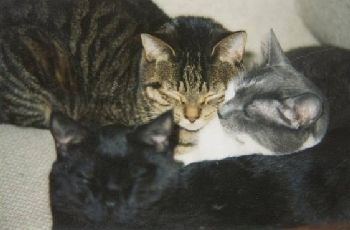 Daniel Johnson and his collection of friends |
(CALGARY, Alberta) - “Cats are a standing rebuke to behavioral scientists wanting to know how the minds of animals work. The mind of a cat is an inscrutable mystery, beyond human reach, the least human of all creatures and at the same time, as any cat owner will attest, the most intelligent.” (Lewis Thomas)
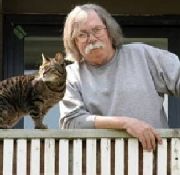
While I’ve lived with many cats in my life—when married, we had as many as three cats in the household—Max, the tabby in the picture, is the first cat with whom I’ve had ever had an individual bond. Max was given to me on March 31, 1997 by Colleen Way, a woman I was dating at the time.
I had been talking about getting a cat “one of these days”. She showed up one evening with a kitten (he had been born February 1, 1997), cat food and litter. But he had no name. I was, at the time, a big consumer of Pepsi Max, knocking back two or three litres day so, that was his name. I’ve since read that Max is one of the most common names for dogs and cats, but that didn’t influence me because I didn’t know anyone with cats or dogs. I just knew what I liked to drink.
Max was probably a fish in his previous life. If I turn on the kitchen sink, he leaps up on the counter, scrambling for footing, to get as close to the tap as he can, where he leans in close and watches the water coming out of the tap. When I take a shower, it’s a similar performance, where he sits on the counter watching the shower curtain until I’m done. After, he gets into the bathtub and watches the last bit of water run out of the tap, staying until he is sure it is all out.
Bill, the big black shown at right, escaped from the SPCA on July 9, 1998.
I believe that Bill picked me
Max was the only cat in the household and he could be pretty wild. I decided to get him a companion. I was pretty busy but knew I had to head up to the SPCA “one of these days”. I already knew the new cat’s name: Bill. Then, one afternoon I was sitting at my desk (I worked out of my home office) I suddenly “knew” that it was time to get Bill. He was “calling” me. I hopped in the car and while on my way, I wondered how I would recognize him.
I had been to the SPCA about ten years earlier getting a cat for my son Ben. At that time they had all the cats loose in one big room. I decided that the first cat that came up and rubbed against me would be obviously be Bill. But, the best laid plans… They had changed everything so that the cats were all in stacked cages around three walls of the room. Now, how to find Bill!
I walked around slowly, looking into the cages and it was so heartbreaking. I wanted to take them all home. (This is not prejudice. I feel the same way thing about dogs, which is why I won’t go into the kennel for any amount of money.) I knew that some of the cats, maybe most of them, would be dead in less than a week.
When I was in high school I worked weekends at the SPCA and one of my jobs each Sunday was to reduce the cat population. I don’t recall the criteria of choosing because cats were not identified so uniquely as were dogs. So, I don’t think it would have been possible to really single out the cats that had been there the longest. But, every Sunday, pick some I did and it was my responsibility to kill them. No other way to put it, and I’m not going any farther down that road, here. Please don’t ask.
Meanwhile, I was looking for Bill. I stopped at one cage and looked in at a huge black cat. We made eye contact and he immediately lay down and started rolling around, purring so loudly that I could hear him a few feet away, above the ambient noise. Obviously Bill.
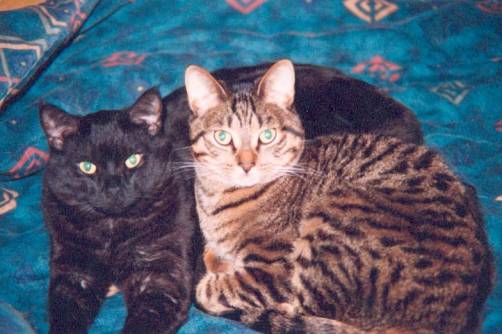 Max and Bill |
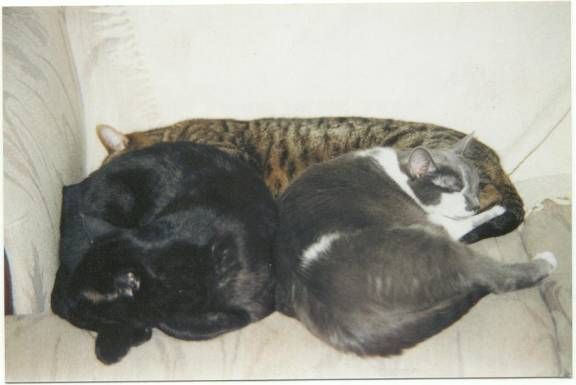
Lucy, the grey and white, was prevented from re-entering the SPCA on March 25, 1999.
Lucy, I think, also picked me. Ben called me one evening to tell me that his dog, Buddy, had been “arrested” again.
That was the term he used when Buddy would get loose and be picked up by animal control. He was being held in custody at the SPCA. Would I drive him there so he could spring Buddy? We parked in the lot and as we were walking in we were followed by a couple carrying a kitten. Oh, I said to them, found a little cat? No, the woman said, obviously unhappy about it. We have to return this kitten. Oh, how come? It turns out that they gotten this kitten as a companion for their older, male cat. But, the male did not like Lucy and tormented the little thing. So, they couldn’t keep her.
Without thinking, I said, I’ll take her. They were pleased that Lucy was going to go to another home. Once back into the SPCA, there was no assurance that she would be adopted. I said the only condition was that if Lucy and my other two cats were incompatible, they would come and get her and carry out their original task.
I took her home in a cardboard cat box. Before letting her out, I grabbed Max and Bill and put them into the bedroom and closed the door. I let Lucy wander around for a couple of hours to get familiar with her new home. Then I let Max and Bill out.
I was not prepared for what happened next. As soon as Lucy saw them, she went crazy. Her hair stood on end and she started hissing. I think that was a response to what her limited experience with other cats had been. She would run up to Max or Bill, hissing and ready for battle. But…nothing happened! Both Max and Bill, in their turn, just sat there looking at her as if to say—okay, now what? And your next trick is?
I was afraid, however, that I wouldn’t be able to keep her, if this was the way she was going to be.
The next day she surprised me again. She was calmer. The third day she was still standoffish, but a little more tolerant. I then called the people (whose names I no longer recall) and told the story and said that Lucy would have a nice home. They were happy.
Lucy’s particular talent is to do somersaults. I go into the bathroom and just after I am seated, Lucy will come in and start to talk to me. Then she will go forward on her forehead and do a somersault. Sometimes she will roll off to one side or the other, but just as often it’s a straight line somersault. Go figure.
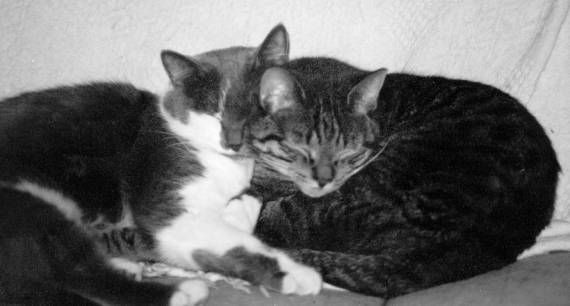 Bill and Lucy |
I also know that I am her human. I belong to her—not the other way around. Ninety percent of the time when I wake up, she is curled up in front of my face. And, when she realizes I am awake, she starts to talk to me. Other than humans, it doesn’t get much better than that. And, when I return to the apartment, she is the one, 99% of the time, waiting at the door, talking to me, when I open it.
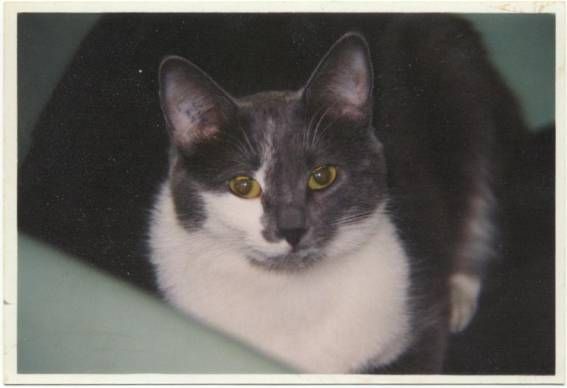
The Door Into Summer
When I was a teenager in the 1950s I first read Robert A. Heinlein’s science fiction novel The Door Into Summer. This passage is how the book got its title.
“While still a kitten, all fluff and buzzes, Pete had worked out a simple philosophy. I was in charge of quarters, rations, and weather; he was in charge of everything else. But he held me especially responsible for weather. Connecticut winters are good only for Christmas cards; regularly that winter Pete would check his own door, refuse to go out it because of that unpleasant white stuff beyond it (he was no fool), then badger me to open a people door.
“He had a fixed conviction that at least one of them must lead into summer weather. Each time this meant that I had to go around with him to each of eleven doors, hold it open while he satisfied himself it was winter out that way, too, then go on to the next door, while his criticisms of my mismanagement grew more bitter with each disappointment.
“Then he would stay indoors until hydraulic pressure utterly forced him outside. When he returned the ice in his pads would sound like little clogs on the wooden floor and he would glare at me and refuse to purr until he had chewed it all out…whereupon he would forgive me until the next time.”
Houseguests
A few years ago I read John D. MacDonald’s Houseguests. He had written over 70 detective/crime type books and I’ve read them all, most of them more than once, some of them regularly. But I never read Houseguests because it was just a book he wrote in 1965 about all the pets he’s had, primarily cats and a goose. I had the book because I had a nearly complete collection of his books. But I decided to give it a try and it was a most pleasant surprise. He has one passage about cats that just echoed Heinlein. Here is what MacDonald wrote :
“Geoffrey hated rain in any degree, and at Clinton he developed his rain procedure. Going to his window and finding it spattering off his cat shelf into his face, he would back away and go to a closed door and start hollering. The door had to be opened so he could look out and see that it was raining out there too. He would go to the next door and repeat the request. That house had many doors. Satisfied it was raining everywhere, he would stay in or, under physiological compulsion, brace himself, go out his window, and race for shelter.
“We [MacDonald and his wife] remember the time much later in Florida when, after we had told him for years that he was an idiot, he proved his point. The summer rains in Florida are often so brief and so concentrated, it can be raining on one side of the street and quite dry on the other. One day at Point Crisp, Geoff started that door-to-door nonsense, backing away from the heavy rain each time. He hollered at the back door and Dorothy opened it for him, and it was dry and bright out there. He plodded on out with that matter-of-factness which seemed to say that he had always known it would work one day.”
Another amusing thing about cats: I used to have a steno-type chair in my home office and Bill would jump on it so I could spin him around. He would get off, stagger and fall down, but later would jump back up and expect me to spin him around again. MacDonald wrote this:
“There was one foolish trick I started doing with [Geoff] that year. He hated it and yet it intrigued him. When he was stretched out on some slippery surface, like the waxed floor of the kitchen, I would bend over him and put one hand on one side of him and one on the other and spin him like a propeller and, with one finger on the nape of his neck, keep him going for a few moments. It gave him vertigo. He would get up and wobble around and look as if he was trying to gag. He would leave the room and, moments later, come right back and flop down in front of me and look up expectantly.”
One day I noticed Bill sitting on a kitchen chair that swivels around (see the light bulb above my head). I gave him some vigorous spins and he hung on. I only spent a few minutes and after getting down, he willingly jumped up again for another spin. Max watched this go on and after Bill had gone away, Max jumped onto the chair. I gave him a few spins and he hung on, too. I gave Lucy a few spins as well and neither of them tried to get away. But neither of them seemed to “like” it the way Bill did.
One more similarity. In 1971 I moved back to Calgary and, until I found a place, I stayed in the spare bedroom of a brother’s house. He had a Siamese cat named Whistlecraft. The room had no furnishings, so I slept on an air mattress on the floor in my sleeping bag. I woke up one morning feeling a bit of damp on one of my feet. I lifted my head and there was Whistlecraft sticking her head out of the bottom of the bag. She must have just licked me, I thought, so I put my head back down. I moved my foot and felt more moisture and jumped up. There was Whistlecraft, having her kittens at my feet, right inside my sleeping bag!The thing about her was that she was sort of standoffish with me, didn’t like to be picked up, would walk away if I approached, that sort of thing. But, she obviously trusted me. I was pleased.
MacDonald wrote that he came home tired one afternoon and stretched out on his bed and took a nap.
About an hour later I was awakened by cat claws needling into my side. My right arm was outstretched, and Pancha had nestled into my armpit. She was purring very loudly and became louder when I stroked her. Every so often she would stop purring, dig her claws into me, then start purring again. It seemed odd behavior. I had my hand on her the next time it happened, and I felt a strange rippling which seemed to start at her shoulders and go down to her back heels. I lifted my head and stared down at her and suddenly realized what was going on. My first impulse was to hustle her to her box, but then I thought that if she had that much trust, if she had selected that particular place to have her kittens, then the least I could do was go along with it.
Who was Milly? Really?
The first year that Helen and I were married (we were divorced a couple of years before I started dating Colleen, who brought Max into my life) we lived on the second floor of a house. On the main floor lived two girls and their pregnant cat. When the cat had kittens and were ready to head out into the world, we decided to take one. She was a black kitten and we named her Milada (pronounced mil aw’ duh) which very quickly became Milly for short.
Milly had only been with us a few days when she escaped and managed to get back to the main floor suite where her mother and siblings were. We went later to retrieve her. But here’s the funny thing. There were two identical female black kittens. We took “Milly” back upstairs but in all the years she lived with us, we were never sure that she was really Milly and not an imposter.
Welcome to the Twilight Zone: Two strange stories
Here’s something I did of which, in retrospect, I am not proud. But, it all worked out.
Ben (my son) had a female cat he had named Claws. Although Claws had lived with us for a couple of years she was, to use a technical veterinary term, a bitch. She was difficult and unfriendly and, in a lot of respects, not much fun to have around—other than with Ben. It was decided (I don’t know if Helen, or I, or both us decided) that Claws had to go. I didn’t want to take her to the SPCA where it would have meant almost certain death. We lived about a mile from the city limits where the actual country began. I drove her about a mile into the country and dumped her out. My rationalization was that it was near a farmhouse and barn and she could surely survive as a barn or farm cat (it was summer at the time but she would have found a situation before the bad weather hit). We told Ben that Claws was probably tired of living with us.
It was almost two months later and we were moving—it was the actual morning of the move. I was upstairs when Helen called out saying there was something I just had to see. I rushed downstairs and there, at the back patio door, was Claws scratching to get in—within an hour of us actually leaving. You figure it out.
The story had a happy ending. In the remaining years that Claws was with us, she was a model cat.
An interesting aside: We lived in a townhouse complex and there was a resident stray living there, that everyone called Johnny Cat. He was the mangiest looking critter you’d ever seen. He lived under various porches and steps and survived on handouts. But he was unapproachable. No one could get near him. One day some of the adults were sitting in our kitchen having coffee and the talk got around to Johnny Cat. Someone suggested, and there seemed to be general agreement, that Johnny Cat should be caught and taken to the SPCA where he could be put out of his misery. My son Ben, who was six at the time, objected aggressively. You can’t do that, he almost shouted. “Johnny Cat has the right to try to live.”
The second story is about Max. He often slept in the bathroom sink. It was the right size for him to curl up. I had a neighbor, Loree, who lived above me and had three cats. She was visiting one day and I pointed out Max sleeping in the sink. We had a good laugh about it. She and I both had had cats living with us most of our lives, but it was something that neither one of us had ever seen or even heard of.
A couple of days later she came down all excited. One of her cats, Pinder, was now sleeping in herbathroom sink.
Now, half the time it’s Bill curled up in the sink.
Dogs and cats
In the 1989 movie War of the RosesDanny DeVito, the lawyer/narrator offers the general advice that dog people should marry dog people and cat people should marry cat people. I recently read an article which suggested that many couples marrying today opt to not have children but, to fill the “need” for little creatures to be dependent on them, get dogs. This concept has merit.
In one of his novels MacDonald wrote about dogs, poodles in particular:
“I watched the office people bring their anxious dogs out. You could almost hear the dogs sigh as they reached the handiest pole. There was a preponderance of poodles.
“This is the most desperate breed there is. They are just a little too bright for the servile role of dogdom. So their loneliness is a little more excruciating, their welcomes a little more frantic, their desire to please a little more intense. They seem to think that if they could just do everything right, they wouldn’t have to be locked up in the silence—pacing, sleeping, brooding, enduring the swollen bladder. That’s what they try to talk about. One day there will appear a super-poodle, one almost as bright as the most stupid alley cat, and he will figure it out. He will suddenly realize that his loneliness is merely a byproduct of his being used to ease the loneliness of his Owner. He’ll tell the others. He’ll leave messages. And some dark night they’ll all start chewing throats.”
I am a cat person by choice, primarily because they require a lot less maintenance. (Even still, I too often forget about the litter box and am ashamed when I finally change it.) But my son’s dog Buddy, mentioned above, often spends days with me. For a couple of years my son lived with me, so we had a menagerie of three cats and one dog. I made up a story and would tell it:
I had a strange dream, I would say. I was helping a neighbor fix his roof, when I slipped and fell to the ground below, landing on my back. I lay on the ground, paralyzed, unable to move. I woke up from the dream and, indeed, I was paralyzed. I couldn’t move. Then I explain it’s because I have three cats lying on one side of me and one dog lying on the other. Of course I can’t move. An inert cat or dog lying on the bed is similar to a bag of cement. Then I think to myself—I hope there isn’t a fire…
Suicide
Jeffrey Moussaieff Masson tells this story in The Nine Emotional Lives of Cats Marie is his friend; Claire is her older sister.
“In 1972, when Claire was twenty-two, the family was living in Burgundy, France, southeast of Paris. Claire decided to go mountain climbing by herself in Argenteuil-la-Bassee, an abandoned village in the mountains some three hundred miles away. Nobody heard from her for weeks. The family was worried, and so was her cat, Minou—so much so that one day the cat stopped eating and would not touch food for the next three weeks. A mountaineer noticed a car, Claire’s car, that had been parked at the foot of a mountain for three weeks. A search party found her body shortly thereafter. Marie, who told me this story, was at home when the car was brought back. Minou crawled under the car and refused to move. Nothing could coax the cat out from under the car, and a few days later she was dead. She had stopped eating on exactly the day, it was learned, that Claire had died. How is this conceivable? Can there possibly be this kind of connection between a loved animal and a human? Is there any mechanism that could explain it? …I remain unconvinced but not completely closed to the idea. I can certainly think of no better explanation.”
Many in New York remember the story of Scarlett, a calico cat who was in an abandoned garage in East New York that was set on fire on March 29, 1996. David Giannelli, one of the first firefighters to arrive on the scene, heard a strange sound and found three small kittens on the grass, in a line. Then two more. Then a few feet away he found the young mother. ‘Her eyes were blistered shut, her mouth, ears and face scorched, her coat badly singed. Her paws were crusted with thick black soot.’ However, she was alive. This street cat had raced back into the blazing garage, running over burning embers five different times, to save each of her five kittens. When David reunited her with her five kittens he had put in a box, ‘she made a sightless head count’ and then began to purr with relief. He drove her to the North Shore Animal League in Port Washington on Long Island. Her inner lids were badly swollen; her skin was severely burned; some of the hair on her body had been singed off; the pads of her feet were burned, as were her mammary glands and her ears. Would she live, and if so, would she ever see again? Even in that condition, when she was put with her kittens in a special oxygen chamber, the first thing she did was count them with her nose, then lick each one, and finally rolled onto her side to let them nurse. Her courage, her pluck, and her willingness to allow herself to be cared for, as if she were saying, The veterinarian who took care of her did his best; she survived, as did four of her kittens, and the world learned about the depths of nonhuman maternal devotion.
Masson also reports a case of a man jumping out a tenth story window committing suicide. His cat followed him; was seriously injured, but lived.
In a 1987 study from the Journal of the American Veterinary Medical Association, two vets examined 132 cases of cats who had fallen out of high-rise windows and taken to an animal hospital for treatment. On average, the cats fell 5.5 stories, yet 90 percent survived, although many had injuries. One cat fell 20 stories without serious injury. The mechanism is simple: They spread out all four legs, to give their bodies a parachute effect, and as they approach the ground, they break the fall by landing on their front feet first and bending their spine to absorb most of the shock. Something to remember if you ever fall off the roof when you’re shingling it.
And finally, an interesting story by Lewis Thomas from A Long Line of Cells
“Bees are filled with astonishments, confounding anyone who studies them, producing volumes of anecdotes. A lady of our acquaintance visited her sister, who raised honeybees in northern California. They left their car on a side road, suited up in protective gear, and walked across the fields to have a look at the hives. For reasons unknown, the bees were in a furious mood that afternoon, attacking in platoons, settling on them from all sides. Let us walk away slowly, advised the beekeeper sister, they’ll give it up sooner or later. They walked until beefree, then circled the field and went back to the car, and found the bees there, waiting for them.”
And the point of all this. It was just fun to write.
===============================================
 Daniel Johnson was born near the midpoint of the twentieth century in Calgary, Alberta. In his teens he knew he was going to be a writer, which explains why he was one of only a handful of boys in his high school typing class—a skill he knew was going to be necessary.
Daniel Johnson was born near the midpoint of the twentieth century in Calgary, Alberta. In his teens he knew he was going to be a writer, which explains why he was one of only a handful of boys in his high school typing class—a skill he knew was going to be necessary.
Daniel began his journalism as a freelance writer in 1974. A few years later he was hired as a reporter for the Airdrie Echo in a town (now city) a few kms north of Calgary. Within a couple of years he was the editor but continued to do most of the writing and photography for the paper.
He expanded from there to do some radio and TV broadcasting for the CBC as well as free lance writing for Maclean’s the Globe and Mail, and a variety of smaller publications. He stopped trying to earn a living in journalism in the early 1980s, because he had no interest in being a hack writer for the mainstream media. Corporate writing, while lucrative, was also soul-destroying.
He turned his hand and mind to computers and earned a living as a programmer and software developer until he retired from that field in 2008.
He has been writing exclusively for Salem-News.com since March 2009 and continues to work on a creative non-fiction book which he began in 1998. You can write to Daniel at: Salem-News@gravityshadow.com
Articles for October 15, 2009 | Articles for October 16, 2009 | Articles for October 17, 2009

Quick Links
DINING
Willamette UniversityGoudy Commons Cafe
Dine on the Queen
Willamette Queen Sternwheeler
MUST SEE SALEM
Oregon Capitol ToursCapitol History Gateway
Willamette River Ride
Willamette Queen Sternwheeler
Historic Home Tours:
Deepwood Museum
The Bush House
Gaiety Hollow Garden
AUCTIONS - APPRAISALS
Auction Masters & AppraisalsCONSTRUCTION SERVICES
Roofing and ContractingSheridan, Ore.
ONLINE SHOPPING
Special Occasion DressesAdvertise with Salem-News
Contact:AdSales@Salem-News.com


Salem-News.com:

Terms of Service | Privacy Policy
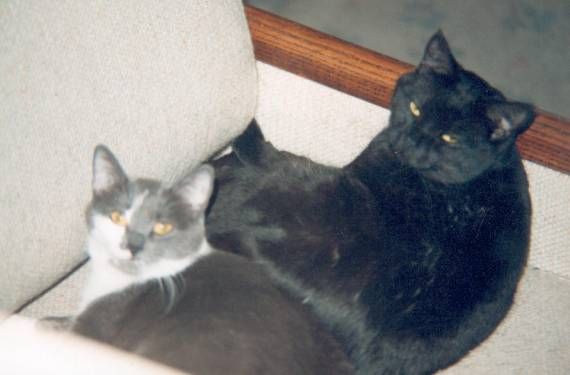

All comments and messages are approved by people and self promotional links or unacceptable comments are denied.
[Return to Top]
©2025 Salem-News.com. All opinions expressed in this article are those of the author and do not necessarily reflect those of Salem-News.com.